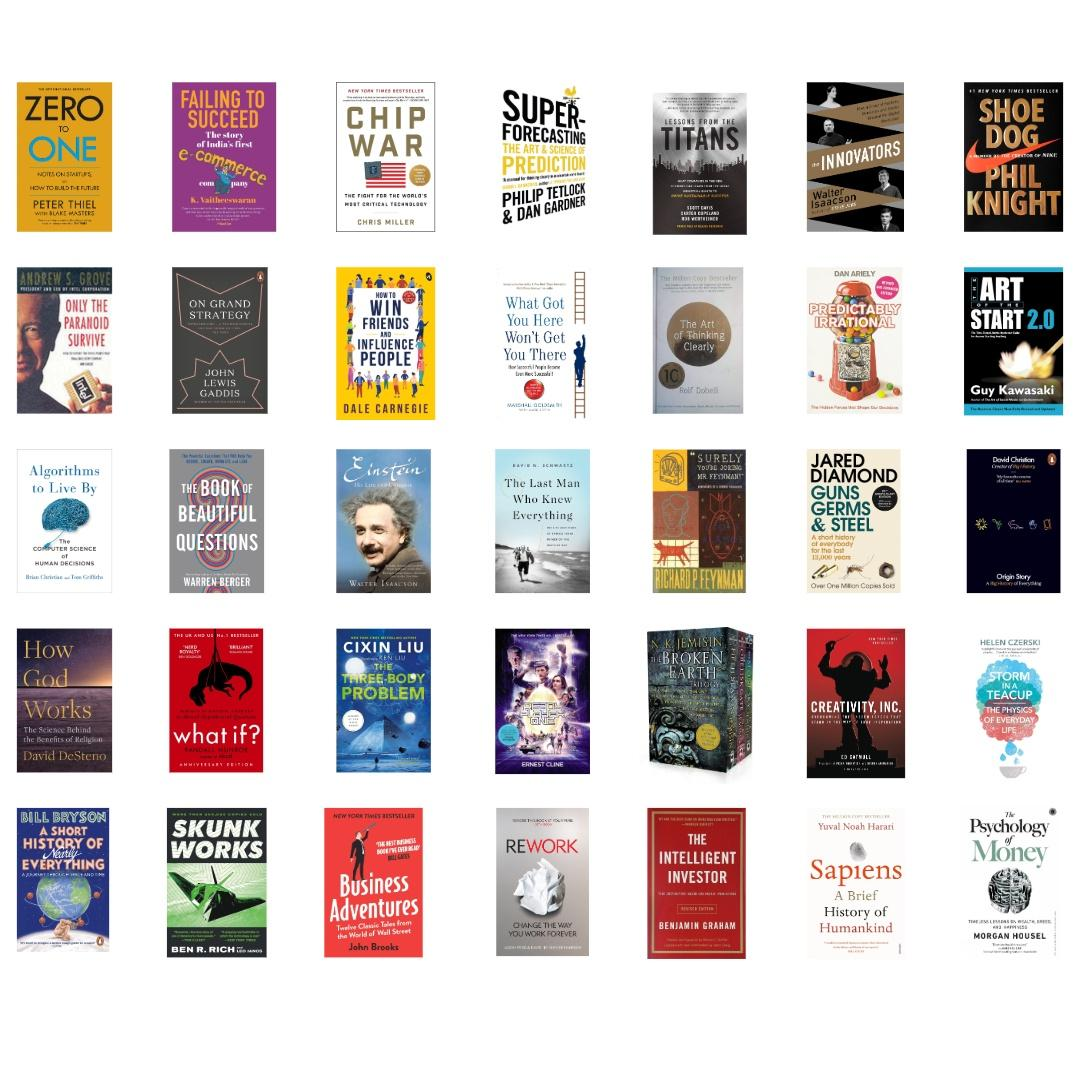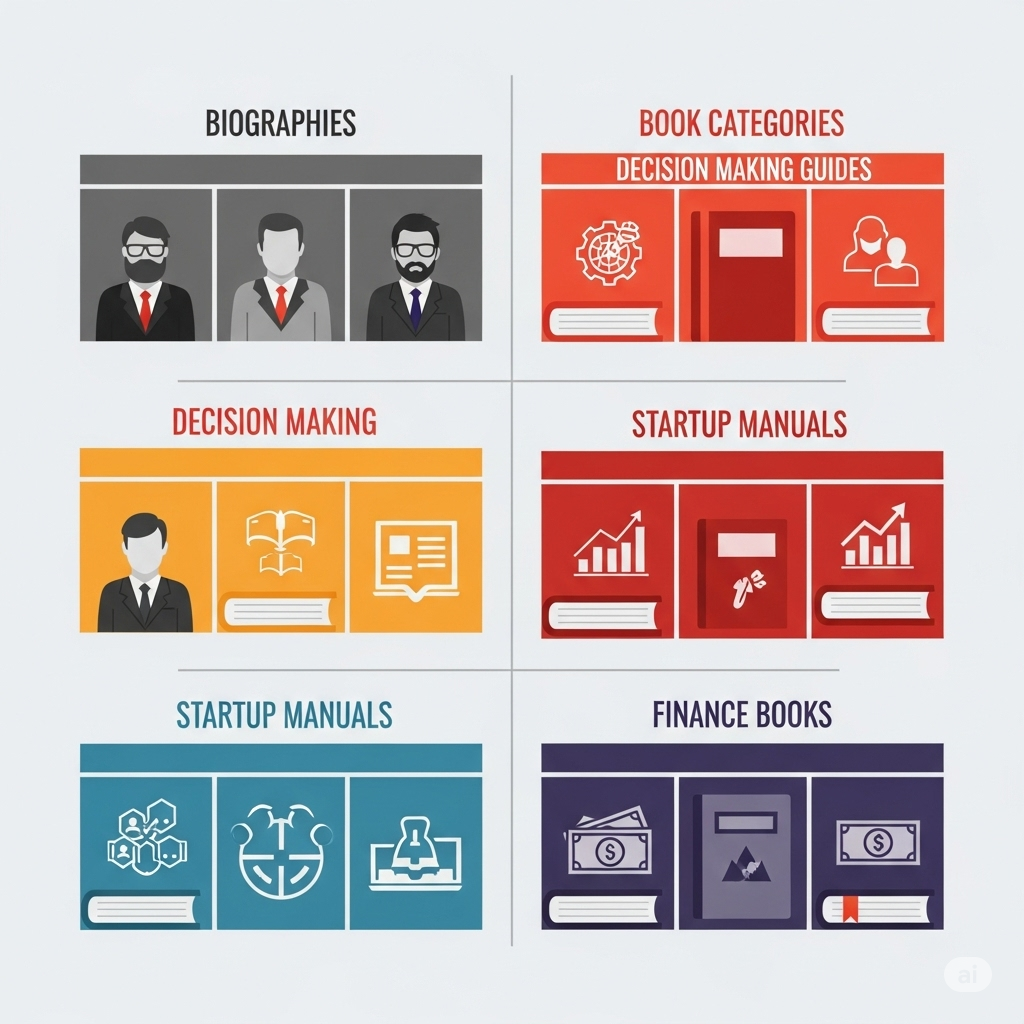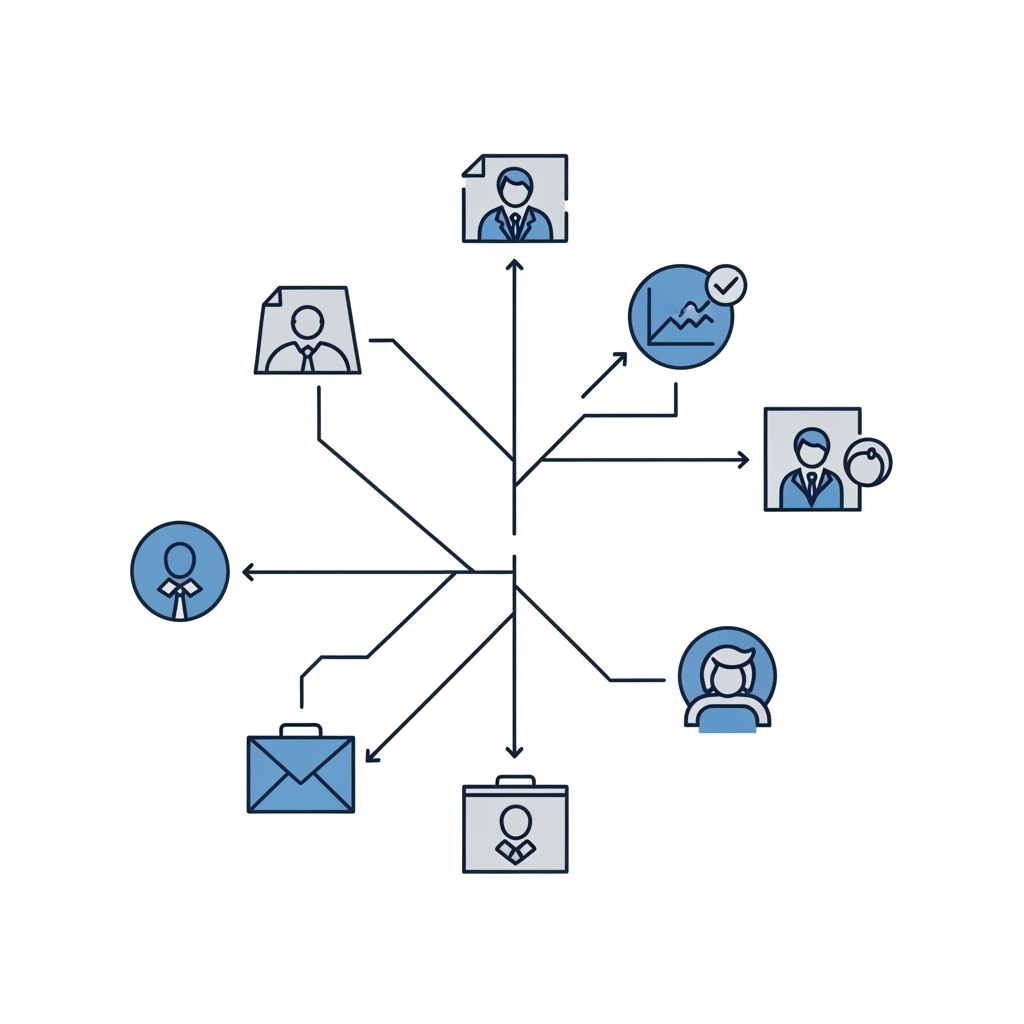Books I Recommend For Reading
Curated reading list of practical business books for entrepreneurs. From startup advice to decision-making frameworks, these books offer actionable wisdom over theory

Essential Reading List for Entrepreneurs and Business Builders
I've been asked countless times about which books I'd recommend for entrepreneurs and business builders. This reading list has evolved over the years as I've discovered new insights and tested different approaches. I update it monthly as I find books that actually move the needle.
My goal is to recommend books that provide practical wisdom rather than theoretical concepts. Each book on this list has influenced how I think about business, decision-making, or problem-solving in some meaningful way. I've organized them by category so you can focus on areas most relevant to your current challenges.

Summary
This reading list focuses on books that offer practical insights for entrepreneurs, decision-makers, and business builders. Rather than academic theory, I've selected books that provide actionable wisdom from real-world experience. The list covers business biographies, management principles, decision-making frameworks, startup advice, financial literacy, productivity systems, and foundational knowledge across science and history.
Key Points
- Business Biographies: Learn from the actual struggles and decisions of successful entrepreneurs and leaders
- Decision-Making: Understand cognitive biases and improve your thinking process through proven frameworks
- Startup Focus: Practical advice for building and scaling businesses without venture capital dependency
- Foundational Knowledge: Science, history, and broader context that informs better business thinking
- Regular Updates: This list evolves monthly as I discover books that provide genuine value
Key Takeaways
- Focus on books that provide practical frameworks you can actually implement
- Business biographies offer unfiltered insights into real challenges and decision-making processes
- Understanding cognitive biases and decision-making flaws is crucial for entrepreneurs
- History and science provide valuable context for understanding how systems and societies evolve

Business Biographies
I've found that business biographies offer something textbooks can't - the messy reality of building companies. These aren't sanitized success stories; they're honest accounts of the decisions, failures, and breakthroughs that shape successful businesses.
Innovators: How a Group of Inventors, Hackers, Geniuses, and Geeks Created the Digital Revolution - This book helped me understand how innovation actually happens. It's not just about brilliant individuals but about collaboration and building on previous work. Essential for understanding how Silicon Valley developed its innovation culture.
Shoe Dog: A Memoir by the Creator of Nike - Phil Knight's unfiltered look at building Nike shows the real struggles behind a global brand. What struck me most was how close Nike came to failure multiple times. It's a reminder that even massive successes started with uncertain beginnings.
The Ride of a Lifetime - Robert Iger's story of rising from a junior position to CEO of Disney offers practical lessons on leadership during transitions. His approach to acquiring Pixar, Marvel, and Lucasfilm shows how to think strategically about growth.
Failing to Succeed: The Story of India's First E-Commerce Company - This book demonstrates that failure can teach as much as success. Understanding why India's first e-commerce company failed provides valuable lessons for anyone building in emerging markets.
Bad Blood: Secrets and Lies in a Silicon Valley Startup - A cautionary tale about what happens when "fake it till you make it" goes too far. Essential reading for understanding the difference between ambitious vision and outright deception.
Skunk Works: A Personal Memoir of My Years at Lockheed - Shows how small, focused teams can achieve seemingly impossible engineering feats. The principles apply beyond aerospace to any challenging project requiring innovation.
Business Adventures - Twelve classic business stories that offer timeless lessons. Warren Buffett calls this his favorite business book, and I understand why after reading it.
Creativity, Inc. - Pixar's approach to maintaining creativity while scaling provides practical frameworks for building innovative cultures. The insights on managing creative teams are particularly valuable.
Only the Paranoid Survive - Andy Grove's account of Intel's evolution shows how to navigate strategic inflection points. His framework for recognizing when fundamental change is necessary remains relevant today.
Business Management & Leadership
These books focus on practical skills for leading teams and making better decisions. I've found them particularly useful as frameworks for thinking about complex business challenges.
On Grand Strategy - This book changed how I think about long-term planning. The historical lessons provide frameworks for strategic thinking that apply beyond military contexts to business strategy.
How to Win Friends and Influence People - Despite being written decades ago, the principles remain highly practical. I reference the frameworks regularly in both business and personal interactions.
What Got You Here Won't Get You There - Essential for understanding how leadership skills must evolve as you take on greater responsibility. The book identifies specific behaviors that limit advancement and provides practical alternatives.
Decision Making
I've become convinced that improving decision-making is one of the highest-leverage activities for entrepreneurs. These books provide frameworks I use regularly.
The Art of Thinking Clearly - This book catalogs cognitive biases and thinking errors in an accessible way. I reference it when making important decisions to check for common mistakes.

Superforecasting: The Art and Science of Prediction - Taught me to think probabilistically rather than in binary terms. The forecasting techniques help in making better predictions about business outcomes.
Predictably Irrational: The Hidden Forces that Shape Our Decisions - My introduction to behavioral economics. Understanding these patterns helps in designing better products and making more rational business decisions.
Startup
These books provide practical advice for building businesses, particularly for those focused on bootstrapped growth rather than venture capital.
Art of the Start 2.0 - Guy Kawasaki's straightforward advice for starting businesses. I appreciate the practical, actionable nature of the recommendations.
The Hard Thing About Hard Things - Focuses on the challenges of running a business that other books don't address. Ben Horowitz's experience provides frameworks for navigating difficult decisions.
ReWork: Change the Way You Work Forever - One of my personal favorites. The 37signals team challenges conventional wisdom about business building and offers practical alternatives to traditional approaches.
Zero to One - While I don't share the widespread enthusiasm for this book, it does provide valuable insights on building monopolistic businesses and achieving product-market fit. Worth reading for the different perspective it offers.
Finance & Investment
Understanding financial principles is crucial for business builders, whether you're managing cash flow or thinking about long-term wealth creation.
The Intelligent Investor - Essential for developing a long-term investment mindset. The principles apply beyond stock picking to business decision-making in general.
The Psychology of Money - Excellent for understanding the behavioral aspects of financial decisions. The insights help in both personal financial management and business planning.
Capitalism without Capital: The Rise of the Intangible Economy - Helped me understand why traditional metrics like GDP don't capture modern economic value creation. Important for anyone building technology or service businesses.
Productivity
These books offer frameworks for thinking more clearly about work and decision-making processes.
Algorithms to Live By: The Computer Science of Human Decisions - Applies computer science concepts to daily decision-making. The frameworks are surprisingly practical for optimizing various aspects of business and life.
The Book of Beautiful Questions - Focuses on asking better questions rather than finding quick answers. This approach often leads to more effective solutions by ensuring you're addressing the real problem.
Biographies
Beyond business, these biographies offer insights into exceptional thinking and problem-solving approaches.
Einstein: His Life and Universe - Understanding how Einstein approached problems provides frameworks for thinking about complex challenges in any field.
The Last Man Who Knew Everything: The Life & Times Of Enrico Fermi - Fermi's approach to problem-solving and his role in the Manhattan Project offer insights into managing complex, high-stakes projects.
Surely You're Joking Mr Feynman: Adventures of a Curious Character - Feynman's curiosity and problem-solving approach influenced how I think about learning and discovery. His stories are both entertaining and instructive.
History

Historical perspective helps in understanding how systems develop and change over time - valuable context for business strategy.
Guns, Germs, and Steel - Challenges assumptions about societal development and provides frameworks for understanding systemic advantages and disadvantages.
Origin Story: A Big History of Everything - I'm a huge fan of this book. It provides context for understanding how complexity emerges over time, which applies to business systems as well.
Sapiens: A Brief History of Humankind - Challenges fundamental assumptions about human development and social structures. Essential for understanding the forces that shape markets and consumer behavior.
A Short History of Nearly Everything - Makes complex scientific concepts accessible while providing broad context for understanding how discovery and innovation work.
Chip War - Essential for understanding the technology industry and geopolitical implications of semiconductor development. Particularly relevant given the current focus on supply chain resilience.
Science
These books help develop better frameworks for understanding complex systems and making evidence-based decisions.
Storm in a Teacup: The Physics of Everyday Life - Makes physics concepts accessible and practical. Understanding these principles helps in thinking about systems and optimization.
How God Works - Examines why religious practices benefit people from a practical perspective. Useful for understanding human behavior and motivation, regardless of personal beliefs.
WHAT IF? - Randall Munroe's approach to answering absurd questions demonstrates rigorous thinking applied to unusual problems. The methodology is applicable to business problem-solving.
Fiction
While not directly business-related, these fiction books offer valuable perspectives on technology, society, and human nature.
The Three-Body Problem - Begins with China's Cultural Revolution and expands into a complex science fiction narrative. The first book has been adapted for Netflix, but I recommend starting with the novel.
Ready Player One - Explores a world where virtual and augmented reality are mainstream. Relevant for understanding potential futures of technology and their social implications. The book provides more depth than the movie adaptation.
The Broken Earth Trilogy - This series won the Hugo Award for each book, which is rare. Set in a world of geological instability, it creates a unique universe that takes time to understand but becomes compelling once you grasp the world-building.

FAQ
Q: How do you choose which books to include on this list?
I focus on books that have actually changed how I think about business, decision-making, or problem-solving. I avoid books that are primarily theoretical and prioritize those offering practical frameworks I can implement. The list gets updated monthly as I discover new books that meet these criteria.
Q: Should I read these books in any particular order?
Not necessarily. I've organized them by category so you can focus on areas most relevant to your current challenges. If you're just starting out, I'd suggest beginning with the Decision Making section, as those frameworks apply broadly.
Q: Why do you include fiction books on a business reading list?
Good fiction often explores future scenarios and human behavior in ways that inform business thinking. The science fiction books I've included, for example, offer perspectives on technology adoption and social change that are relevant for entrepreneurs.
Q: How often do you actually refer back to these books?
More often than you might expect. I keep digital notes and highlights from most of these books, and I reference the frameworks regularly when making decisions or solving problems. The books aren't just for one-time reading; they're resources I return to.
Q: Are there books you'd recommend avoiding?
I try to focus on recommending rather than discouraging specific books. That said, I generally avoid books that are heavy on theory but light on practical application, or those that promise quick fixes to complex problems. Business is nuanced, and the best books acknowledge that complexity.
Q: Do you have a preferred format for reading these books?
I primarily read on Kindle as I can easily transfer highlights and notes for later reference. This frees me to engage with the book without worrying about losing important insights. For particularly complex books, I sometimes prefer physical copies for easier navigation between sections.
Please note that this list includes Amazon affiliate links.The book recommendations remain genuine and based on their practical value, not potential earnings.
This reading list will always be a work in progress. As I discover new books that provide genuine value for entrepreneurs and business builders, I'll continue updating it monthly. My goal is to maintain a curated collection of books that offer practical wisdom rather than theoretical concepts you can't actually implement.